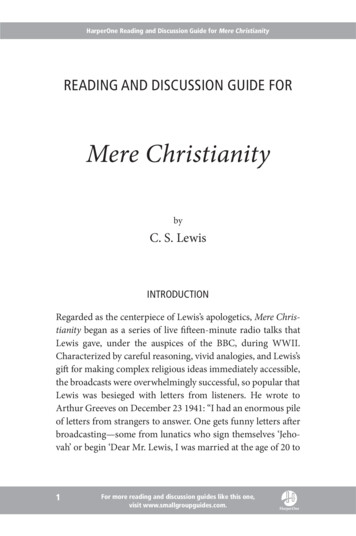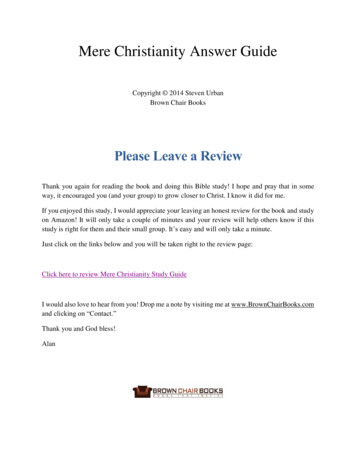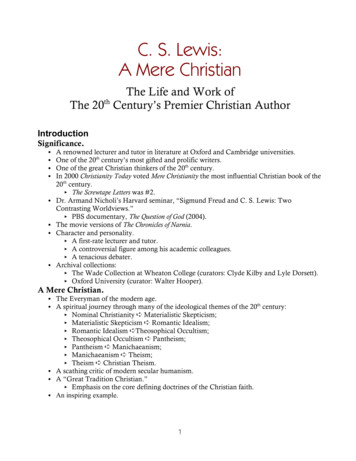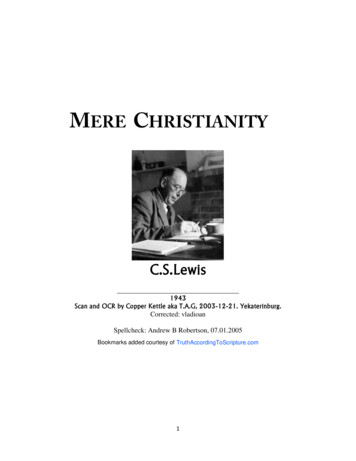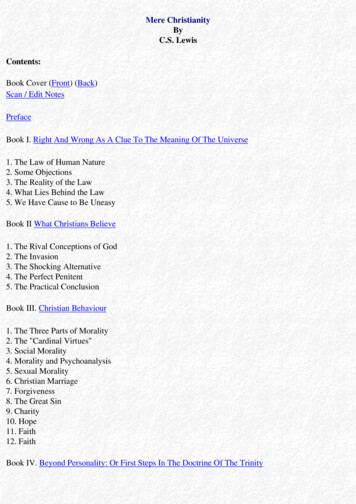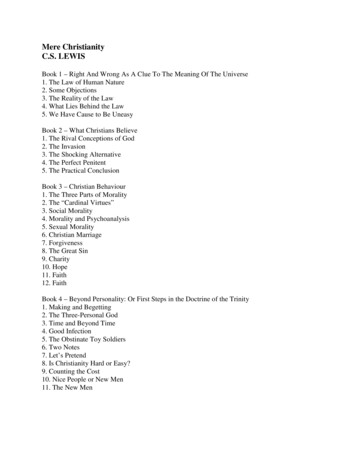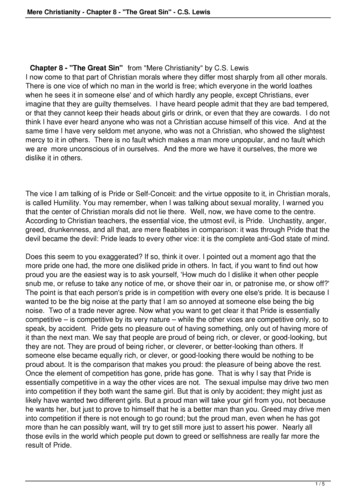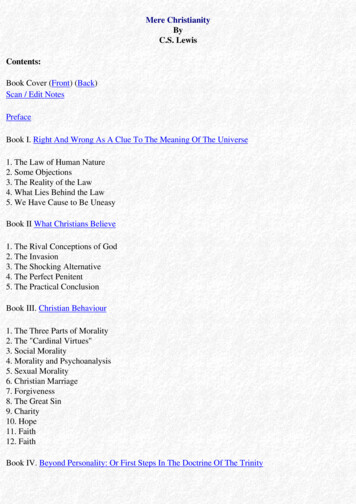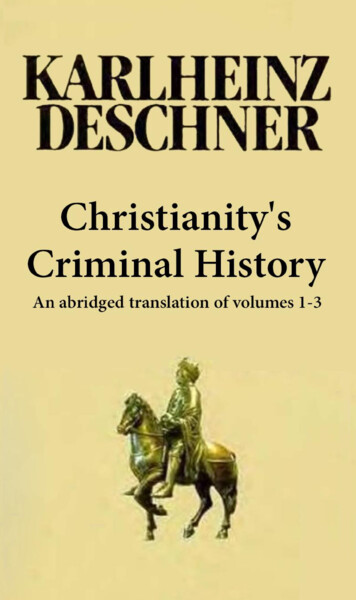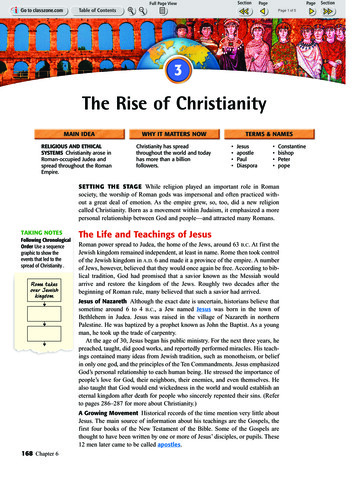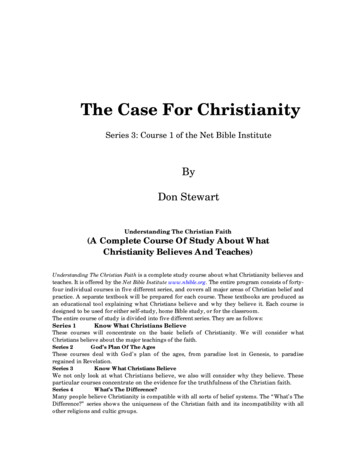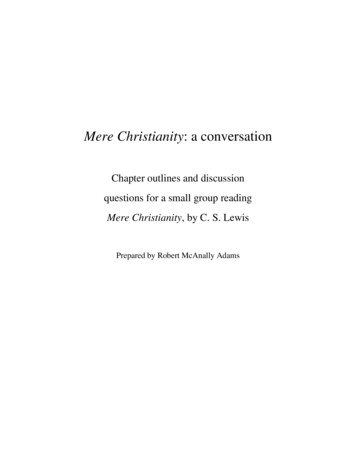
Transcription
Mere Christianity: a conversationChapter outlines and discussionquestions for a small group readingMere Christianity, by C. S. LewisPrepared by Robert McAnally Adams
NotesC. S. Lewis’ classic, Mere Christianity, has been a challenging, interesting, and engaging book forboth individuals and small groups for many decades. Whether a small group consists of Christians, a mixof Christians and non-Christians, or Christians of contrasting persuasions, Mere Christianity can beexpected to focus the participants’ attention on the vital characteristics of historic Christianity, providinga fresh perspective for most and a sharp clarity for all. These study outlines and discussion questions areintended to stimulate and extend thoughts that spring from the book.Page numbers refer to a popular edition published by HarperCollins available since 2001. It can beidentified by ISBN 978-0-06-065292-0. While neither the Preface nor the Foreword are outlined ordiscussed here, they are both worthwhile, and a small group leader should urge the members to read themboth carefully.This material is also available on a blog site athttps://merechristianityconv.blogspot.com/Any notes or corrections may be logged on the website.Many thanks to the members of the Growth Group who worked their way through this with me andthus helped to improve and refine the discussion questions.RMA 2/6/20
Mere Christianity, Book I: Right and wrong as a clue to the meaning of the universeChapter 1: The Law of Human NatureI. Consciousness of a rule of correct behavior is nearly universal.A. The rule is similar throughout the world and history.B. Unlike physical nature, obeying the rule is voluntary.II. People often do not follow the rule.A. The failure to follow the rule often produces claims of exception or excuse.B. Claims of exception and excuses underscore people's consciousness of the rule's existence and force.III. These ideas are the foundation for understanding the moral universe.Discussion questions: (pp. 3-8)1. What evidence have you observed for the existence of the Law of Human Nature? (pp. 3-5)2. How does the Bible treat the idea of Natural Law, as in, for instance, Romans 2:14-16?3. Is the Law of Human Nature fairly uniform across time and cultures? (pp. 5-6)4. We expect others to keep the law, but do we keep it? (pp.7-8) Why not? Does this agree with Paul’sexperience in Romans 7:21-23?Copyright 2020, Robert McAnally Adams
Mere Christianity, Book I: Right and wrong as a clue to the meaning of the universeChapter 2: Some objectionsI. Objection 1: The Rule of Right Behavior could simply be one of our instincts.A. The Rule helps us to decide among conflicting instincts, which are not inherently right or wrong.B. The complete dominance of any given instinct over all others invariably leads to evil.C. Therefore, the Rule is not one of the instincts.II. Objection 2: The Rule of Right Behavior could simply be a social convention.A. The Rule is learned but not arbitrary.B. The Rule’s existence makes moral progress possible.C. Therefore, the Rule cannot be merely a social convention.D. Moral progress is not the same as progress in knowledge.Discussion questions: (pp. 9-15)1. Are instincts and impulses morally neutral? (pp. 9-11)2. Is it true that any instinct, under the wrong conditions, can lead to evil? (pp. 11-12)3. Extra credit: what is conscience?4. Why is the Moral Law not just a human convention? (pp. 12-13)5. Can you give an example of moral progress? Is Luke 6:31 such an example? (pp. 13-14)6. What does Jer. 31:33 tell us about the way that the Moral Law comes to us?Copyright 2020, Robert McAnally Adams
Mere Christianity, Book I: Right and wrong as a clue to the meaning of the universeChapter 3: The Reality of the LawI. The Law of Nature is fundamentally different from the laws of physical nature.A. A law of nature may mean no more than "what nature, in fact, does."B. The Law of Nature describes what people ought, but often fail, to do.II. The rule of correct behavior is not a means to something else, but a manifestation of a different kind ofreality.A. The Law does not necessarily represent behavior that is useful or convenient for some otherpurpose.B. The Law does not necessarily represent merely those behaviors that, as individuals, a society, or anation, would afford the best chance to live safely and productively.C. The Law is not made up.Discussion questions: (pp. 16-20)1. How are the laws of nature different from the Laws of Human Nature? (pp. 16-18)2. How is the Moral Law, “Unselfishness is good,” transformed into “One ought to be unselfish”?What gives the Moral Law force? (pp. 16-19)3. Why is right action not always profitable? (pp. 19-20)4. Is there another, intangible reality in which the Moral Law exists? How can we know this? Relatethis to 2 Cor. 4:17-18. (p. 20)Note on currency, p. 19: In the old British currency, there were 20 shillings to the pound; thus, thecomparison in the text is between 30 shillings and 60.Copyright 2020, Robert McAnally Adams
Mere Christianity, Book I: Right and wrong as a clue to the meaning of the universeChapter 4: What Lies Behind the LawI. Science cannot decide between the two main explanations for existence.A. Materialist—all things exist for no reason and have produced us by chance.B. Religious—behind the universe is something that is most like a mind, with consciousness andpurpose.II. Neither view is much like the God of Christianity.Discussion questions: (pp. 21-27)1. What prevents science from deciding between the materialist and the religious views of what theuniverse is and how it came to be? (pp. 22-23)2. Is the ultimate “why” answerable? How do “cause” and “purpose” differ?3. Lewis distinguishes “does” and “ought to do”. Does this mean that there is a Power outside ourobservable universe that informs us of right and wrong? (pp. 23-25)Copyright 2020, Robert McAnally Adams
Mere Christianity, Book I: Right and wrong as a clue to the meaning of the universeChapter 5: We Have Cause to be UneasyI. The best way to make progress is to correct past mistakes.II. There are two pieces of evidence about the "Something" behind the universe.A. "Something" made the universe the way it is.B. "Something" made us and placed in us the knowledge of the law of correct behavior.C. We infer that "Something" is interested in correct behavior.D. But we have no basis for inferring that "Somebody" is good, forgiving, indulgent, or any otherproperty.III. We are on the wrong side with this "Something".Discussion Questions: (pp. 28-32)1. Are we on the wrong road? (pp. 28-29) In what ways?2. Is God the only comfort and the supreme terror? (pp. 30-31)3. Is the realization of our true situation “the way back to the right road”? (p. 32) See Matt. 9:10-13.Copyright 2020, Robert McAnally Adams
Mere Christianity, Book II: What Christians BelieveChapter 1: The Rival Conceptions of GodI. Christians do not have to believe that other religions are completely wrong.II. First divisionA. Atheists (minority)B. Theists (majority)1. Second divisiona. Pantheistsi. God is beyond "good and evil"ii. God is part of the universeb. Monotheistsi. God is interested in "good and evil" and strongly committed to good.ii. God is outside the universe and created it, typically monotheistic.III. If a good God made the world, why has it gone wrong?A. An argument against God, who cannot be good if He created an unjust worldB. The judgment that the world is unjust requires a notion of justice. But where can that come from, ifnot God?Discussion Questions: (pp. 35-39)1. Some hold that the Old Testament stories of creation, the Fall, the flood, and the ethics of the Laware derived from a prior source. What would Lewis say to that? (p. 35)2. Are the divisions of religious views fair? Do you see any problems with it? (pp. 35-37)3. Is Christianity a "fighting religion"? (pp. 37-38)4. Can God be denied on the grounds that the universe is unjust? (pp. 38-39)Copyright 2020, Robert McAnally Adams
Mere Christianity, Book II: What Christians BelieveChapter 2: The InvasionI. Reality and ReligionA. Reality is not simple; therefore religion cannot be simple.B. Reality is often odd and not neat; therefore religion can be odd and not neat.C. Reality is not what one would have guessed; therefore religion is not what one would have guessed.II. The problemA. Reality contains the bad and meaningless.B. Reality also contains creatures like us who understand "bad" and "meaningless".III. Two solutionsA. Christianity describes a world gone wrongB. Dualism describes a world with two equal powers, one bad and one good, at war with each other.1. What is the implication of universal "good" and "bad"?a. If good and bad have universal meaning, then one is right and the other wrong.b. Then there is a standard higher than either by which to judge between them, promulgated by thetrue God.c. Then the "good" power is in the right relationship with God, and the "bad" power is not.2. What are the natures of "good" and "bad"?a. Goodness can be loved for its own sake; badness cannot.b. Badness can exist independently but can only exist as spoiled goodness.3. Dualism cannot work because the two powers are not independent; badness is dependent ongoodness.C. In Christianity, the war between goodness and badness is a rebellion or civil war.1. We are in occupied territory.2. The good king has come in an unexpected way to lead the resistance.3. We are being actively attacked.Discussion Questions: (pp. 40-46)1. How has reality's complexity affected you? (pp. 40-42)2. "God did not invent religion; it is God's statement of quite unalterable facts about Himself." How doyou react to that? (p. 41)3. What defect undermines dualism? Is evil always dependent on good? (pp. 43-45)Copyright 2020, Robert McAnally Adams
Mere Christianity, Book II: What Christians BelieveChapter 3: The Shocking AlternativeI. Free will.A. Even as God is all-powerful, the conditions in the world are contrary to His will.B. Free will makes evil possible.C. Free will makes love possible.D. God made it possible for man to be evil.II. How the Devil went wrong.A. Satan wanted to be the center instead of God.B. Man wanted to be independent of God.1. Man wanted to find or create happiness apart from God.2. There can be no happiness apart from God.III. A fatal flaw develops in the best institutions of man.A. God sent us conscience.B. God sent us "good dreams".C. God selected the Jews to reveal His nature to.1. There is only one God.2. God cares about conduct.IV. God sent JesusA. The shocking claim that Jesus is God.B. The claim to forgive sins.C. The claim that He is humble and meek.D. Jesus cannot be described as a "great moral teacher" unless His other claims are granted.Discussion questions: (pp. 47-52)1. How free are we? (pp. 47-49)2. Is there happiness apart from God? (pp. 49-50)3. Utopia is hopeless in life. why? (p. 50)4. Is the assessment of Jesus, that he can be either insane, a demon, or Lord, fair? How can He be agreat moral teacher? (pp. 51-52)Copyright 2020, Robert McAnally Adams
Mere Christianity, Book II: What Christians BelieveChapter 4: The Perfect PenitentI. The Purpose of the IncarnationA. TeachingB. Death and ResurrectionII. The AtonementA. The essential belief: Christ's death makes it possible to be right with God.B. Theories of the Atonement1. The fact more important than the theory2. The theory of substitutionary punishment3. The theory of paying our debtIII. RepentanceA. Man is a rebel who must lay down arms.B. Humiliation and a kind of deathC. Only God can help with repentance.D. Repentance requires the Incarnation.E. An absurd objectionIV. If theories of Atonement are not helpful, abandon them.Discussion Questions: (pp. 53-59)1. What is the essential belief about the Atonement? (pp. 54-55) See John 1:29 and Matthew 20:28.2. What is the debt? (pp. 56,58) See Romans 6:20-23 and Colossians 2:13-15.3. Why is repentance like a kind of death? Why is it both essential and impossible without God's help?(pp. 57-58) See Titus 2:11-14 and Hebrews 2:14-18.Note for pp. 54-55: Sir James Jeans (1877-1946) and Sir Arthur Stanley Eddington (1882-1944) werewell-regarded British physicists and mathematicians who wrote (the former particularly) on physics andcosmology for the general public.Copyright 2020, Robert McAnally Adams
Mere Christianity, Book II: What Christians BelieveChapter 5: The Practical ConclusionI. New life via biologyII. Acquiring the Christ-lifeA. Via baptism, belief, and Holy CommunionB. True on Jesus' authority1. Authority is the most common source of knowledge.2. Authority is necessary to life.III. Imitation of Christ the main meansA. Baptism, belief, & communion are useful but not sufficient.B. Christ-life enables repentance.1. Christ-life is not the same as trying to be good.2. Christ-life is the source of good.C. "In Christ" and "Christ in you"1. Believers constitute the physically present body of Christ.2. Christ operates in the world through this body.IV. What about the heathen?A. None can be saved except through Christ.B. No information on those who do not know Him by name.C. This uncertainty is no reason to reject His salvation.V. Why does not God simply defeat Satan and the wicked, and just clean up the whole mess?A. He will, but we don't know when.B. He is granting more people the opportunity to join His side voluntarily.C. When He does come, the time for voluntarily joining His side will be over.Discussion Questions: (pp. 60-65)1. If belief is a means of acquiring the Christ-life, how do we acquire belief? (p. 61) See Romans 10:4.2. Are there abuses of arguments from authority? (p. 62) How can we distinguish them from validones?3. Can you think of other obstacles to faith, such as, the divisions in the church, or the seemingcontradictions between the Bible and science? What would Lewis's response to them be?Copyright 2020, Robert McAnally Adams
Mere Christianity, Book III: Christian BehaviorChapter 1: The Three Parts of MoralityI. Morals are directions for running the human machine.II. Critique of “ideals”A. Calling moral perfection an “ideal” can be misleading.1. Ideals can be different for each individual.2. Moral perfection is not a matter of personal taste.3. Moral perfection is not a matter of degree.B. “Rules” and “obedience” is better language for morality than “ideals”.III. Three EssentialsA. Areas of failure and the reasons for it1. Fair play and harmony among individuals, that is, social morals2. Harmony within the individual3. An understanding of the purpose for human beingsB. Stopping short1. Many stop with social morals for two reasonsa. Failures lead to obvious consequences in many spheres.b. Most are in agreement about social morals.c. Many do not believe in morals beyond the social morals.2. Law does not make goodness that is essential to a good society.IV. Human destinyA. Do we belong to ourselves or to Another, who made us?B. Given the Christian view of eternal life, the relative valuations of concerns is different from worldly valuations.Discussion Questions: (pp. 69-75)1. Lewis writes, “You cannot make men good by law; without good men, you cannot have a good society.” (p. 73) Do youagree?2. Whom do you belong to? Yourself? God? Those whom God has given to you to love? (p. 74)3. What light does Matthew 16:26-27 cast on the questions of morals? (p. 75)Copyright 2020, Robert McAnally Adams
Mere Christianity, Book III: Christian BehaviorChapter 2: The ‘Cardinal Virtues’I. Another way of looking at moralityA. Prudence1. A child's heart, but a grown-up's head2. Christianity is an education in itself.B. Temperance1. Right use2. Not restricted to drinkC. JusticeD. FortitudeII. Virtue as a part of characterA. Perseverance in virtue produces character.B. Three wrong ideas1. The right thing for the wrong reason2. Mere obedience to a set of rules3. Virtue only for this present lifeIII. Heaven has a lot to do with what you are becoming.Discussion Questions: (pp. 76-81)1. How does perseverance relate to each of the cardinal virtues? (pp. 77-79)2. How does perseverance relate to character? (pp. 79-80) See Romans 5:3-4 and James 1:2-4.3. Consider the following statement: “Heaven has a lot to do with what you are becoming.” (p. 81) Do you agree?Copyright 2020, Robert McAnally Adams
Mere Christianity, Book III: Christian BehaviorChapter 3: Social MoralityI. Christianity teaches no new social morality—the Golden RuleII. Christianity has no detailed political programA. Christianity is a director for human arts and effortsB. On the Church’s leadership1. The members of the Church should be finding ways to implement the Golden Rul in their disciplines.2. It does not mean that clergymen should run the state or businesses.III. A Christian SocietyA. Features1. Everyone works with their own hands producing something useful and good—no silly luxuries.2. There would be respect for elders and obedience to leaders.3. It would be cheerful.B. No one likes the whole plan.IV. Two particular issuesA. Usury—right or wrong?B. Charity—when is it enough?V. How to get thereA. To get a Christian society we must desire it.B. To desire it, we must become fully Christian and love our neighbor.C. To love our neighbor, we must love God.D. To love God, we must obey Him.E. In other words, the way to a Christian society is through inward transformation.Discussion Questions: (pp. 82-87)1. Is it within our power to build a Christian society? (pp. 84,87)2. How can we overcome our fear for our security and be more complete in our charity? (pp. 86-87)3. Is the Sermon on the Mount (Matt. 5-7) a sketch of a Christian society?Copyright 2020, Robert McAnally Adams
Mere Christianity, Book III: Christian BehaviorChapter 4: Morality and PsychoanalysisI. Two jobs that must be begun at once:A. Understanding how to apply the 'Golden Rule' in detail to modern society.B. Becoming the sort of people who would want to apply it if we knew how.II. PsychoanalysisA. The medical and scientific theory of curing psychic disease must be respected.B. The philosophical accretions by Freud need not be respected.III. A moral choiceA. The choice itselfB. The raw materials that precede and influence the choice1. Case 1: natural feelings2. Case 2: abnormal feelings and fearsa. Curing abnormal feelings is possible through psychoanalysis.b. The patient is still free to make a moral or immoral choice.C. Bad psychological material is a disease to be cured.IV. How man and God judgeA. Man judges by externals.B. God judges the heart, taking into account all the raw material.C. God’s judgements may be very different from our own.D. Much of the raw material is physical and will depart.E. These are the reasons we are told not to judge.V. The consequences of choicesA. The result of each choice is a minute change of character.B. The net trajectory of character is either heavenly or hellish.1. The effect of choices is cumulative.2. God’s grace alone can straighten out the fault that bad choices leave.C. Knowledge of good and evil1. Those who are improving understand good and evil better.2. Those who are getting worse understand neither.Discussion Questions: (pp. 88-93)1. Compare Romans 7:14 with Lewis’s statement, “God does not judge [one] on the raw material.but on what [one] has donewith it.” (p. 91) Does God judge us on a “sliding” scale?2. What are Freud’s philosophical assertions, that Lewis would reject?3. Is progression towards a heavenly (or hellish) creature (p. 92) related to the “becoming” Lewis discussed on p. 81?Note: V.C. stands for the Victoria Cross, the highest British military award for bravery (p. 91).Copyright 2020, Robert McAnally Adams
Mere Christianity, Book III: Christian BehaviorChapter 5: Sexual MoralityI. The virtue of chastityA. Chasity and modesty1. Chastity distinct from modesty/propriety, which is cultural.2. Chastity is uniform across all times and cultures.3. Confusion between these has led to discomfort and misunderstanding.B. The standard for Christian chastity1. Christian chastity is marital fidelity or total abstinence.2. Chastity is contrary to our instincts and the most unpopular of virtues.a. Sexual appetites greatly exceed the biological purpose.b. Contraception has permitted far more sexual activity.c. Society has become far more tolerant.d. Sexual appetite grows with indulgence.C. “Sex is nothing to be ashamed of.”1. As a means of propagation and that it is pleasurable, Christians agree.a. Christians hold the body to be one of God’s good creations.b. Without the fall, sexual pleasure might be greater.c. Christianity glorifies marriage.2. As rampant sexual license in today’s culture, Christians disagree.a. There is endless propaganda against chastity.b. Industries use our sexual instincts to make money.II. The desire for chastityA. Today it is difficult to summon the desire for chastity.1. We are told that sex is healthy and normal in all circumstances.2. No help is given to distinguish the obsessions and excesses of sex.3. We are told that perfect chastity is impossible.4. For controlling natural instincts we need God’s help.a. For each failure we ask forgiveness and try again.b. We must not be satisfied with failure.III. Confusion over sexual “repression”A. Repression is a technical term of psychology, distinct from suppression.B. Resisting sexual desire is not repression.C. Attempting virtue brings light; indulgence brings fog.IV. Chastity is not the center of Christian morals.Discussion Questions: (pp. 94-103)1. What is the evidence that, “If it feels good, do it,” is wrong? (pp. 97-98)2. Explain the role of God’s forgiveness in unchastity. (p. 101)3. Why do people think that Christians regard unchastity as the worst sin? (pp. 102-103)Copyright 2020, Robert McAnally Adams
Mere Christianity, Book III: Christian BehaviorChapter 6: Christian MarriageI. Definitions for marriageA. Married partners are a single organism.B. Marriage is for life.C. The union has aspects that go far beyond the sexual.II. DivorceA. Christian churches have a high view of marriage.B. Popular culture calls for easy divorce.C. Keeping marriage vows places the question in the realm of justice.D. Control of sexual impulses is a duty, as with all other impulses.E. Unbelief in permanent marriage should dissuade people from it.III. Being in loveA. Being in love causes people to bind themselves with promises.B. When being in love ceases1. Being in love is a feeling.2. Feelings change and diminish.3. Being in love yields to actual love.IV. Actual loveA. Actual love is a deep unity, willed, strengthened by habit, reinforced by grace.B. Myth: Being in love continues indefinitely.C. The thrill of being in love is displaced by the commitment of love.D. Myth: Falling in love is irresistible.E. Like any feeling or impulse, it can and should be resisted by married people.V. There should be a sharp distinction drawn between civil marriage and church marriage.VI. The head of the familyA. There must be one head, because equality can result in deadlock.B. There is something unnatural about a man being dominated by his wife.C. A woman’s interests lie within the family, whereas a man can be more just to the outside world.Discussion Questions: (pp. 104-114)1. “Love is the great conqueror of lust.” Do you agree? Why? (p. 108)2. Can ‘being in love’ give way to committed love? How be this fact be conveyed to young people, especially given the focusin popular culture on ‘being in love’? (p. 108-109)3. Leaving aside St. Paul’s other remarks about the role of women, for the moment, do Lewis’s reasons for male headshipmake sense? (pp. 112-114)Copyright 2020, Robert McAnally Adams
Mere Christianity, Book III: Christian BehaviorChapter 7: ForgivenessI. Nice in theory, hard to practiceA. We argue from difficult cases.B. Begin with something easier: a family member or co-worker.II. To love as one loves selfA. One loves self, not because one is nice or lovable.B. Hate the sin but not the sinner.C. We love ourselves despite our sins and failures, constantly forgiving ourselves.D. We ought to hate evil, but we can hope that the sinner, like ourselves, is not entirely evil.III. Hatred and hopeA. Hatred wrongly directed destroys.B. Hatred consumes our universe.C. Even of the worst person, one can hope for a better ultimate outcome.IV. Problem with 6th CommandmentA. The Hebrew word is “murder”.B. One is not prohibited from justifiable killing.C. The key is not to hate, when killing is necessary.V. The meaning of loving our enemyA. To love someone means to wish his good, as we wish our own good.B. God wants us to love all selves the way we love ourselves.C. God love us in this way.Discussion Questions: (pp. 115-120)1. Dag Hammarskjöld wrote, “Forgiveness breaks the chain of causality because he who ‘forgives’ you—out of love—takesupon himself the consequences of what you have done. Forgiveness, therefore, always entails a sacrifice.” [Markings, tr. LeifSjöberg & W. H. Auden, New York: Alfred A. Knopf, 1964 (post.), p. 197] Does this idea conform to Lewis’s idea offorgiveness? Jesus’s idea? (pp. 115-116)2. Does hope help us to separate the sin from the sinner? (pp. 117-118)3. “I can forgive, but I can’t forget.” How is this idea related to Christian forgiveness? (p. 120)Copyright 2020, Robert McAnally Adams
Mere Christianity, Book III: Christian BehaviorChapter 8: The Great SinI. The vice of prideA. We despise it in others.B. We are unconscious of it in ourselves.C. It is the complete anti-God mind-set.D. Pride is inherently competitive.1. Pride is only satisfied in being above others.2. Pride acts for its own sake, not for the sake of acquiring.3. The actions of pride are about power.II. Consequences of prideA. Pride results in enmity; pride is enmity.B. The proud cannot know God.C. Pride and religion1. The worship of the proud is to an imaginary God.2. The proud believe they have God’s approval.3. Consequently, they think they are better than others.4. The spiritual sin of pride can enter into the heart of religious life.5. One should watch for the attitude of superiority in oneself, an indicator of pride.III. Pride and other vicesA. Pride can be used to defeat other vices, but to terrible effect.B. Pride is spiritual cancer.IV. Four possible misunderstandings of prideA. Pleasure in being praised is not necessarily pride.B. Pride in another’s accomplishments is not necessarily pride.C. Humility is a doorway to knowing God.D. A truly humble person is not self-deprecating.Discussion Questions: (pp. 121-128)1. Identify the role of pride and the lesson to be obtained from the parable of the Pharisee and the Publican in Luke 18:10-14.(p. 124-125)2. Why does Martin Luther write, “I am more afraid of my own heart than of the pope and all his cardinals. I have within methe great pope, Self“? (pp. 122,124)3. How can pride be defeated? (p. 128)Note: “Two of a trade never agree.” A proverb dating back to the 16th century. Meaning: two people in the same business willalways disagree about the proper service to offer the customer, each regarding his own opinion as superior to the other. (p. 122)Copyright 2020, Robert McAnally Adams
Mere Christianity, Book III: Christian BehaviorChapter 9: CharityI. Charity, love in the Christian senseA. Charity is more than alms.B. Charity is not an emotion.II. Loving neighbor as selfA. Charity is like self-love but directed towards other.B. Liking or affection are natural, not a sin.C. Liking and affection can aid charity.D. Taken to the extreme, they can undermine charity.III. Becoming charitableA. Affectionate feelings are not the path to charity.B. Feelings are hard or impossible to manufacture and are of little use to charity.C. Rather than waiting for feelings of love, act as though you love.D. Loving actions lead to love.E. Likewise, cruel actions lead to hatred.IV. The increase of good and evilA. A small action of love can have great results for good.B. A small indulgence or negligence can have disastrous results for evil.V. Love of GodA. Love of God is not a feeling.B. To act as God wills is the love of God.C. God’s love for us is relentless.Discussion Questions: (pp.129-133)1. How can one master natural affections and disinclinations in order to love in the Christian way? (p. 130)2. Is acting as though one loves another a pretense? Is praying for another a help in loving? (p. 131)3. How does 1 John 5:3 line up with Lewis’s thesis? (p. 132)Copyright 2020, Robert McAnally Adams
Mere Christianity, Book III: Christian BehaviorChapter 10: HopeI. The theological virtue of hopeA. For the Christian, hope is not escapism or wishful thinking.B. Christians should think of the eternal world while working in this one.C. What the Christian hopes for is not available in this world.II. A peculiar observationA. Those Christians who achieved the most occupied their minds with thoughts of Heaven.B. Since Christians largely ceased to think of Heaven, they have become less effective.C. Often, to arrive at a worthy goal one must aim at a better one.III. Hope for HeavenA. Hope for Heaven is difficult.1. Most of our hopes are worldly.2. Heavenly hopes are often unrecognized.B. Heavenly hopes can lead to earthly disappointment.C. Three ways of dealing with the inadequacy of earthly fulfillment of hope1. Fool’s way — continually to try different things to reach fulfillment.2. ‘Sensible’ way — to lower one’s expectations.3. ‘Christian’ way —a. . is to recognize that hopes and longings are meant to be fulfilled;b. . is always to be thankful for what one has;c. . is never to forget the desire for true fulfillment.IV. Do not be fooled by the contempt some people have for Christian imagery for the inexpressible.Discussion Questions: (pp. 134-137)1. Can you think of an example of the rule, “to arrive at a worthy goal, one must aim at something else, something better”? (pp.134-135)2. What does Jesus say abo
Notes C. S. Lewis' classic, Mere Christianity, has been a challenging, interesting, and engaging book for both individuals and small groups for many decades. Whether a small group consists of Christians, a mix of Christians and non-Christians, or Christians of contrasting persuasions, Mere Christianity can be expected to focus the participants' attention on the vital characteristics of .
